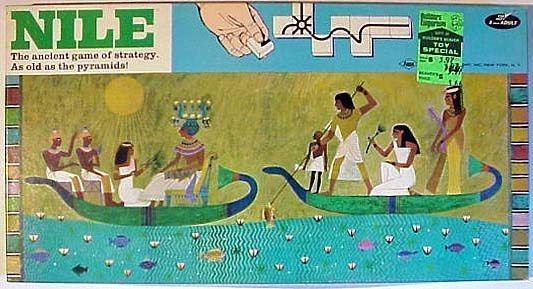Nile (1967) Board Game
The Nile board game was released in 1967 and designed by William L. Dodge. It is categorized as an abstract strategy and territory building game, with a tile placement mechanism. The game is designed for 2-4 players and has a runtime of about 60 minutes. The game features artwork by the E. S. Lowe Company Inc. and Spear’s Games.
Game Components of Nile
How To Setup Nile
To set up the game, players first lay out the game board, which represents the ancient Nile River. Each player chooses their markers and places them at the starting points on the board. The tiles, which are the core of the game, are shuffled and placed face down within reach of all players.
Gameplay Mechanics and Game Objective
Player Experience
Playing Nile involves a blend of strategy and luck, as players must think ahead to create continuous lines while also adapting to the tiles they draw. The game requires a good balance between short-term and long-term planning, making it engaging and challenging for players.
Pros
Cons
Personal Thoughts on Nile
Nile is a game suited for those who enjoy abstract strategy games and are looking for a classic, nostalgic experience. It’s ideal for players who appreciate games that require thoughtful planning and can handle a degree of luck. While it may not be as dynamic as modern board games, its simplicity and historical value make it a compelling choice for collectors and strategy enthusiasts.
We are supported by our audience. When you purchase through links on our site, we may earn an affiliate commission, at no extra cost for you. Learn more.

